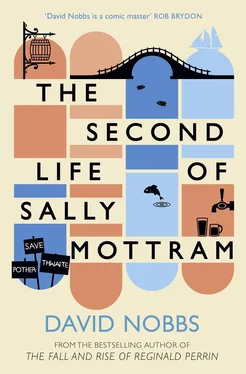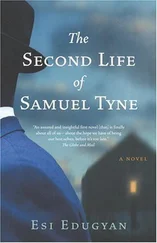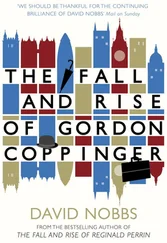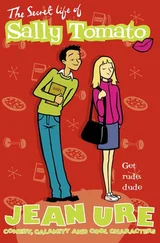DAVID NOBBS
The Second Life of Sally Mottram
For Chris
Contents
Cover
Title Page
Dedication
Map
BOOK ONE: The First Day
1. Two nines and a six
2. In the cul-de-sac
3. Purely routine
4. A lovely evening
5. The Fazackerly sisters
6. A very short chapter, but fear of a very long evening
7. Marigold goes to a party
8. Ben arrives home late
BOOK TWO: Sally Makes a Journey, and a Decision
9. Going south
10. A small flat in Barnet
11. Sam’s worry
12. In which Totnes is mentioned many times
13. Uncharacteristic behaviour
14. A surprise
BOOK THREE: The Work Begins
15. A Tuesday in spring
16. The Great Bruise Special
17. Sally breaks new ground
BOOK FOUR: Conrad
18. The great cities of Italy
19. A thousand miles apart
20. A long, hot summer
21. Sally’s dread
22. Dinner for two
23. The march
24. The waiting
25. A grand night in the hills
26. Marigold seeks advice
27. A resounding whisper
28. A glorious weekend
29. A difficult meal
30. Sally confronts her soul
BOOK FIVE: Transition
31. An emissary with a wet handshake
32. A life of luxury
33. A hard decision
34. An unfinished manuscript
35. An envelope of distinction
36. Public and private changes
37. Flood control
38. The remorseless passage of time
39. Before the deluge
40. The deluge
41. After the deluge
BOOK SIX: The Last Day
42. Morning
43. Afternoon
44. Evening
Acknowledgements
About the Author
Also by David Nobbs
Copyright
About the Publisher
Of course they didn’t know, on that day, that it was the first day.
Sally Mottram had never liked Potherthwaite. She had never even liked the North of England. She endured it because of Barry’s business.
She liked it less than ever today. She had walked the length of the High Street, as part of her exercise routine, and because she wanted to call in at the bookshop on the Potherthwaite Quays – the plural was an exaggeration. There she had received the devastating news that the bookshop would close in three weeks, unable to match the special offers given elsewhere in a world where a book is expected to be a little cheaper than a starter in Pizza Express.
On the Quays there was a very basic café and an empty building with a rusting sign that stated ‘ The Terminus Bist o ’. The bistro had closed its doors – another exaggeration, its door – seven months ago. Soon ‘The Canal Bookshop’ would also be empty. One day a letter would drop off there too, and ‘ The anal Bookshop ’ would fester among the floods for ever.
This was the scene at the end of the Potherthwaite Arm of the Rackstraw and Sladfield Canal, which the great Sir Norman Oldfield no less had once planned to turn into a rival for Wigan Pier. Sally stood and looked at the dereliction. Up the canal, three narrowboats lay moored. One had sunk, but the canal was so shallow that it was hard to notice this. The second was rotting, as was its occupant, a sculptor who had suffered from sculptor’s block for seventeen years. The third was beautifully maintained, and lived in by a rather posh couple, who had once just managed to get to the Quays through the silt, only to find that there was no longer enough water in the cut for them to turn round and go home. They had lived there for eight and a half years now, getting slowly older and slower, but always offering generous noggins to their new friends.
Something had to be done about Potherthwaite, but who would do it?
She turned her back on the sad scene, and began to walk along the unimaginatively named Quays Approach towards the east end of the long High Street. Waddling complacently towards her was Linda Oughtibridge. Some people thought she did the flowers for the church quite beautifully. Others didn’t. Linda Oughtibridge was in the former camp, Sally Mottram in the latter. Sally noticed something that afternoon that had never occurred to her before. Linda Oughtibridge was just about the squarest woman she had ever seen.
‘Oh, good afternoon, Mrs Mottram,’ said Linda Oughtibridge in a voice treacly with false enthusiasm. ‘Not a bad day.’
Not a bad day! This was almost the final straw for Sally. It was a vile day. The lowering sky was uniformly grey. True, it was dry, but there was dampness in the chill air. True also that there was no wind, but the stillness was so complete that the air almost became solid; walking through it was hard work.
There’s a certain kind of smile that demands to be wiped off a person’s face, and there’s a certain kind of face that demands to have the smile wiped off it. Linda Oughtibridge possessed just such a face, and just such a smile, and she was smiling now. The words formed themselves irresistibly in Sally’s brain.
‘Oh, piss off!’
The shocking words hurtled from her brain towards her lips, where she clamped down on them just in time.
‘Not so bad, Mrs Oughtibridge.’
In twenty-four years of meeting, neither Sally nor Linda had ever ventured into Christian-name territory.
The narrowness of her escape brought Sally Mottram’s flesh out in goose pimples. She had nice flesh; she was an attractive woman in a slightly restrained way, but with an elegant shapely backside over which at least two men in the town fantasized furiously. She was forty-seven, and was experimenting, but not too boldly, with hair the colour of straw. She had a husband and two grown-up children, a boy and a girl. Her husband was a lawyer. She was not the sort of person who said ‘Piss off’ to esteemed arrangers of the church’s flowers.
She walked slowly along High Street East, past two pubs, one of them boarded up, past two nearly-new dress shops, three charity shops and five empty buildings.
She passed a rash of tediously named enterprises – the Potherthwaite Café, the Potherthwaite Arms, the Potherthwaite and Rackstraw Building Society – and stepped into the Market Place, which was full of unlovely parked cars. The two best buildings were banks. The Town Hall, on the south side of the square, had architectural pretensions that it didn’t quite justify. The George Hotel had once looked handsome, but was peeling badly. On the west side of the square was the Victorian church, stone, solid and almost as square as Linda Oughtibridge. The church had been built to look instantly old. Paradoxically, it looked less old with every year that passed.
A noticeboard outside the church announced: ‘ If you want to be saved, there’s always a welcome here. ’ Beneath it someone had scrawled: ‘ If you don’t, call at 9 Canal Basin and ask for Sophie. ’
Beyond the church, the River Pother crossed under the High Street at an angle. Sally paused on the bridge, and looked down at the sullen stream. There had once been dippers, inappropriately lively and pretty, dipping eponymously on the little rocks in the middle of the river. There were no dippers now. Today there were only the two bipolar mallard, swimming listlessly against the sluggish waters.
She stopped to take in the scene. The river curved round the edge of the graveyard and ran north-east to the great textile mills, not a window unbroken now. Beyond the mills, rows of houses climbed the lower slopes of Baggit Moor as if turned to stone while striving to escape from the river’s last flood. She shuddered. She had almost said ‘Piss off’ to Mrs Oughtibridge. It was time to take herself in hand. It was time to get a grip.
Читать дальше












